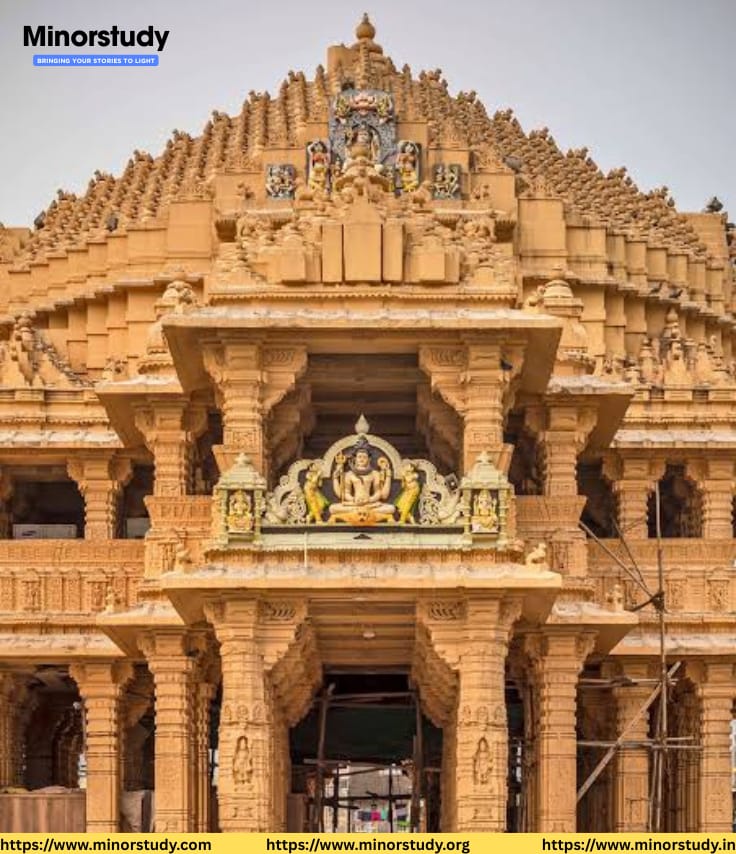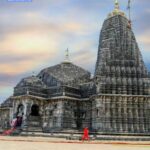🕉️ Introduction
Somnath Temple: Nestled on the sacred shores of the Arabian Sea in Prabhas Patan, Gujarat, the Somnath Temple stands not just as a magnificent structure of devotion but also as a symbol of resilience, hope, and eternal faith. As the first among the twelve Jyotirlingas of Lord Shiva, Somnath has seen centuries of invasions and reconstructions, yet it continues to radiate spiritual grandeur. In this detailed guide, we explore its history, cultural impact, interesting facts, and why it remains one of India’s most important religious sites.
- 🏛️ History of Somnath Temple: A Saga of Destruction and Rebirth
- 📌 Timeline of Major Events
- 🌟 Amazing Facts About Somnath Temple
- 🙏 Religious and Spiritual Significance
- 📖 FAQs About Somnath Temple
- 🌄 Observances and Rituals at Somnath
- 🌺 Wishing and Prayers at Somnath
- ❤️ Importance in Our Life and Society
- 🔚 Conclusion: Eternal Flame of Faith
- ✨ Powerful Wishes You Can Share
- 🔖 Key Takeaways
🏛️ History of Somnath Temple: A Saga of Destruction and Rebirth
The Somnath Temple has a rich and tumultuous history that reflects the indomitable spirit of Indian civilization:
Mythological Origins: According to the Skanda Purana and Shiv Purana, Soma (Chandra Deva) constructed the temple in honor of Lord Shiva to seek penance for his curse by Daksha. Pleased with his devotion, Shiva restored Soma’s brilliance, giving rise to the name “Somnath” – The Lord of the Moon.
Ancient Construction (c. 1st millennium BCE): Historians believe the original temple was built in gold by the Moon God, then rebuilt in silver by Ravana, wood by Krishna, and stone by Bhimdev – symbolizing eternal reconstruction.
Repeated Destruction: The temple was destroyed and rebuilt over 17 times by invaders like Mahmud of Ghazni (1025 CE), Alauddin Khilji, and Aurangzeb, making it one of the most attacked Hindu temples in India.
Modern Reconstruction (1951): Post-independence, the temple was rebuilt under the vision of Sardar Vallabhbhai Patel, showcasing the revival of India’s spiritual and cultural pride.
📌 Timeline of Major Events
| Year/Period | Event |
|---|---|
| Mythical Era | Built by Soma (Chandra) in gold |
| ~649 CE | Reconstructed by King Maitraka of Vallabhi |
| 1025 CE | Destroyed by Mahmud of Ghazni |
| 1093 CE | Rebuilt by King Bhimdev I |
| 1299 CE | Again destroyed by Alauddin Khilji’s army |
| 1706 CE | Demolished by Aurangzeb |
| 1947–1951 | Reconstructed under Sardar Vallabhbhai Patel’s guidance |
| Today | Managed by Shree Somnath Trust; a site of active worship and pilgrimage |
🌟 Amazing Facts About Somnath Temple
🔭 Zero Shadow Mystery: The temple is built such that there is no landmass in a straight line between Somnath and the South Pole, symbolizing it as the eternal shrine.
🛕 First Jyotirlinga: Among the twelve Jyotirlingas, Somnath holds the primordial position, believed to be the first to manifest.
💣 Resilient Symbol: Despite being destroyed 17 times, it was rebuilt every time with greater devotion, making it a global symbol of resilience.
🧭 Triveni Sangam: It is located at the confluence of three rivers – Kapila, Hiran, and Saraswati.
🧱 Chalukya Style Architecture: The modern temple was reconstructed in Chalukyan style, reflecting the ancient Indian temple-building tradition.
🇮🇳 Patel’s Dream: It was one of Sardar Patel’s first missions post-Independence – reclaiming India’s spiritual and cultural identity.
🌊 Oceanfront Sanctity: The temple opens directly to the Arabian Sea – a rare and serene divine setting.
🙏 Religious and Spiritual Significance
The Jyotirlinga is believed to emit its own light, representing the formless power of Shiva.
A visit to Somnath is said to wash away lifetimes of sins and purify one’s soul.
Somnath is closely linked with Lord Krishna’s last journey from the earth, adding to its mythological importance.
Pilgrimage during Mahashivratri is considered especially auspicious.
📖 FAQs About Somnath Temple
Q1: Who built the current Somnath Temple?
👉 The present temple was built by the Shree Somnath Trust under the guidance of Sardar Vallabhbhai Patel and K. M. Munshi.
Q2: Is Somnath Temple open to non-Hindus?
👉 Yes, non-Hindus can visit the outer premises, but the sanctum sanctorum is restricted to Hindus only.
Q3: What are the temple timings?
👉 The temple is open daily from 6 AM to 9 PM, with Aarti at 7 AM, 12 Noon, and 7 PM.
Q4: Which nearby sites should I visit?
👉 Bhalka Tirth, Triveni Sangam, Prabhas Patan Museum, and Junagadh Gate are must-visits.
Q5: How to reach Somnath?
👉 Nearest airport: Diu (80 km); Railway Station: Veraval (7 km); Well connected by roadways.
🌄 Observances and Rituals at Somnath
Mahashivratri is the most important festival, celebrated with night-long bhajans, fasts, and special darshan.
Shravan Month (July-August) draws millions for Rudrabhishek and Parikrama.
Somwar (Mondays) are especially significant, with long queues for Shiva darshan.
Devotees often perform abhisheka with Gangajal, milk, and honey.
🌺 Wishing and Prayers at Somnath
🙏 When visiting Somnath, devotees often wish for:
Spiritual strength and clarity
Relief from diseases and karmic cycles
Peace and prosperity for the family
Guidance in difficult life situations
✨ A simple yet powerful mantra for Somnath:
“Om Namah Shivaya. Shree Somnath Jyotirlingaya Namah.”
❤️ Importance in Our Life and Society
Somnath is not just a temple; it’s a living symbol of hope, strength, and faith.
🧠 Personal Life:
Inspires mental resilience and devotion
Teaches forgiveness and letting go of pain
Encourages inner peace through spiritual connection
🌏 Societal Role:
A symbol of cultural unity and heritage preservation
Boosts local economy through tourism and pilgrimage
Promotes eco-consciousness through riverfront preservation
🔚 Conclusion: Eternal Flame of Faith
The Somnath Temple, rising proudly on the western coast of India, is much more than an architectural wonder. It is a testament to India’s spiritual strength, timeless culture, and the unshakable belief in divine truth. Whether you are a believer or a curious traveler, Somnath offers something profound—a moment of silence, self-realization, and sacred connection.
Let Somnath remind us all that faith, no matter how many times tested, always finds a way to rise again—just like this glorious temple did, time and again.
✨ Powerful Wishes You Can Share
📿 “May Lord Somnath bless you with boundless strength, inner peace, and unshakeable devotion. Har Har Mahadev!”
🌊 “As the ocean touches the feet of Somnath, may divine grace touch your soul. Om Namah Shivaya!”
🔖 Key Takeaways
Somnath is the first Jyotirlinga and one of India’s oldest sacred temples.
Rebuilt 17 times, symbolizing eternal faith and resilience.
Holds immense spiritual, historical, and cultural significance.
A must-visit destination for seekers of peace, power, and purpose.








